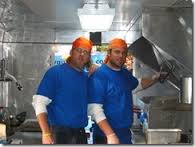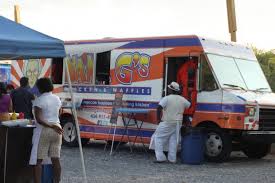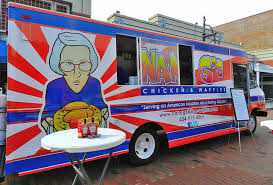One of the bastions of the southeast and southern BBQ, and practically connected by the hip to neighbor Florida, Georgia is no stranger to the sweep of food truck fever. We’ve already discussed the trials and battle that the city of Savannah has and is still going through to create their own society and band of successful truck, read about it Here. Contrary to that, however, the capital of Atlanta is thriving, practically overcrowded with over 60 trucks currently in their roster. It’s safe to say that, like its fellow big cities across the border in Florida, the region has settled into a dense and lively street food community.
If you’re looking to get into a city that has fully set up and run through the beginning stages of food truck incursion, a place where events are rolling rather often and the regulations, though maybe not the most ideal, have run through the original confusion periods, than Atlanta may be just for you. But beware, for this also means it can be that much harder to work yourself in as one of the surviving cornerstones amongst the crowd; it may have developed into a family, but there are still a lot of trucks to compete with. Not to mention, considering they’ve hit their stride, the speed of change for any habits and regulations that aren’t ideal are going to be much slower, if not at all; meaning one has to go in expecting to deal with the annoyances from now until, well, ever.
In order to thus survive, you’ll need a better idea of what playing field you’ll be rolling into, and the best way of course is to start asking other trucks. We’ll start it out for you of course; in fact, we were lucky enough to be able to grab an interview with the practically legendary Atlanta cornerstone truck, Nana G’s Chicken and Waffles. Owner and operator, Guy, generously donated some of his time to discuss his home turf for us.
 Question: Why don’t you start off by telling us about you and the truck, what’s your story?
Question: Why don’t you start off by telling us about you and the truck, what’s your story?
Guy: My name is Guy, I’m 45, was in the clothing business for 25 years, one thing led to another, men and women changed the way they were buying clothes for themselves when the recession hit seven years ago, and ended up losing everything. And then one day had some buddies at my house in Miami, watching the Food Network, saw these food trucks and that was kinda when the craze was starting, went looking around Miami saw there were some down there, then ended up flying out to LA to research and see what the craze was about. While I was doing that, my mom started taking care of my grandmother, who’s 104 today, and she found a box of recipes, which is kind of a coincidence as we were already out researching and trying to define who we are. So we started experimenting with recipes, thought about opening the truck, and then one thing led to another, had a party at my house with 65 people, taste testing some of my grandmother’s recipes, took a secret ballot, and Chicken and Waffles was the favorite. A week later I bought a truck, wrapped it, and here we are 3 ½ years later we are one of the hottest food trucks probably in the southeast I think.
Q: From what you know, how did Atlanta become and grow into the Food Truck-filled city that it is today?
Guy: Well I think Atlanta, over the last probably 5 years, has really become a true Food, Restaurant-kinda connasieur city you could say in a nutshell. Some of the best restaurants that I’ve been to in this country are here now, and I’ve traveled all over the US being in the clothing business. But I think every city is changing now because we’re all becoming foodies now, we’ve all become bored with the average tv show on the cable channel, and the Food Network and Travel Channel has really opened doors to things about food that I don’t think people have ever really thought about.
And that’s given an opportunity with the food truck, to give an entrepreneur like myself to take a chance on something. Instead of having a million dollars to open up a restaurant, for $40,000 you can go out to get a food truck and try and create a name and a niche for you. That’s what we’ve done, and we brought in 2 trucks now, have 3 franchises on the table, we’ve been on 2 TV Shows (US of Bacon and Deep Fried Champion), and are getting ready to film on another show coming in March-April.
Q: Have there been any groups that have popped up to help the local truck owners in starting out, surviving, and banding together? Are there any other resources you have used or would suggest other new owners to look into?
Guy: I think the first thing you need to know about when you become an owner of a truck is it’ all about research, and it just depends how fat your bank account is. For us, we’re a small mom and pop family, not a lot of money, so we had to not nickel and dime our business but really watch our p’s and q’s. If you got the money sure you go out and spend on a brand new truck, all with stainless steel, whereas for us we bought all our equipment used because restaurants go out of business every day. If you do the research you find that, everything on our truck is used and it’s good stuff, good working equipment, got a rack and one thing led to another and we got the truck.
And for your other question, that’s going to be a big fat no. This is one of the largest cutthroat industries that I’ve ever been involved. Now we have a Food Truck Coalition, the guy is a lawyer who’s trying to become a delegate or senator in the state of Georgia, he started an ice cream truck and started the coalition. It’s kinda been good or bad, but at the end of the day it’s $500 a year to be a part of it, which is just ridiculous because he doesn’t do anything for you. He’ll go out and get events but then he charges you to be involved in them, then these things lead to other things which ends up being a political thing, cuz, if you’re not involved in ‘his circle’ on a regular basis than you’re not going to get the deals.
At the end of the day there’s 60 trucks in Atlanta now, about 50 are members to one organization, well if there’s an event and it goes to 5 trucks then there are 55 guys being left out. So it becomes a cutthroat business, and of course we’re a member there, I’m not happy about it, but like I said we’re one of the better trucks in the city, we stay busy every day and almost every night, it’s easy for us to make the payment. But for some of these other trucks that are starting, it’s tough.
Q: What are your favorite parts of operating a truck in Atlanta in particular?
Guy: My favorite part is probably the window, I’m a front and center, personal guy; I’m the face of our brand, you know, I enjoy dealing with people and selling the menu, sorta comes from my background. My brother’s the opposite, he’d rather be cooking the food in the background, making sure everything is done right and going out the door the right way.
Q: What’s your least favorite, any disadvantages?
Guy: It’s a tough city to work in, there are about 60 trucks here, the people that are looking for food trucks to come to their building for trucks or do an event, there’s a variety now. It’s made Atlanta a little tougher on getting around for food trucks, and the better trucks, the guys who have established themselves from the get-go, we’ve gone out and put together contracts. We ourselves have got a contract with Georgia Tech where we’re on their campus 2 days a week, with another place 2 days a week, and Moorehouse 1 day, so there’s my work week right there, I’m filled. I feel blessed for all this, don’t have to wait for anyone to call me anymore, I’ve got my schedule for the next year; so Mon-Fri we’re out on all these campus 10-2/3 a day, then I’ll go wherever I need to at night to survive.
And then, the next thing, probably the only two things we hate about the business, is the Traffic. And that’s why we’re trying to push to do a Brick-and-Mortar is because the traffic has gotten so bad in the last year and a half, vs three years ago when we launched, that in now takes you an HOUR every day to get to your gig every day, sitting in traffic, and it takes you literally an hour to get home. And the food truck rule is you have to go back to your Commissary after each gig, just the law and requirements, so soon as you’re done you have to go back, put everything in your freezer or clean or whatnot before you go back out. So that’s the kinda been the real headache me and my brother have gone through, 2 hours of road rage every day.
Q: Are there any regulations that should be heavily paid attention to by any new owner in the area, either due to uniqueness, difficulty in compliance, or annoyance and cost?
Guy: Well the compliance rules are changing every day. In my opinion, the city WANTS the food trucks here, but they don’t how to run them properly, don’t really know what to do. So they’ve adopted some research and laws off of food trucks, but it hasn’t really done anything because those laws they’ve gone and adopted are only really viable to what they call “Governor’s Walk” here in Atlanta, which is right downtown between the courthouse and the federal building another building, it’s like a four block radius, where they want the food trucks to be down there, but there’s no business in that area. It’s kind of a crazy thing, like the commissary law which they just changed; when we got in, your kitchen could be anywhere, so if you knew a buddy who owned a restaurant, you could work out of it. So now you have to go to a commissary kitchen, do a shared thing with 5 other food trucks, or you could go the route that WE’VE gone and found a catering company here in Atlanta, and we’ve partnered up with them and put some legal information together to re-word it so we’re in compliance with the state law, where they are more a “Manager” of our truck than it is a true Lease on a property to rent.
The other law they just established is that your food truck must be parked on the PREMISES of the Commissary, whereas some people were doing one and the building didn’t have a parking lot, so they were forced to leave that commissary and find something else where their vehicle is on the property. So if the Department of Health wants to come out and inspect it they can do so at anytime, know where you are.
Q: How’s the parking situation, any distinctive things we should be aware of? Are there any places that are better for trucks to focus their attention on vs others?
Guy: Street parking is still not allowed in allowed in the city of Atlanta except for the Governor’s Walk, but that is where you are actually able to put the money in the meter and pay for the two hours that you’ve got. And you can get extra time on those 2 hours if you’re feeding the meter, but again that’s only a 4-square block radius, and that’s downtown, all the other spots around the city are not allowed to be used.
Getting out there at festivals, events, and private parking is easy and allowed though. But the city DOES require you to have a permit to be out there; in fact, they other thing they’ve just passed this July, almost makes you think the city is trying to get rid of the trucks, is now you’re only allowed to have 2 locations to do business at and vend. Well, there’s only 7 days a week, and if you only have 2 places, people are going to get sick of you in no time. And then, if you want to change one of the locations, they put a fee to it of $250 per location. Where the first 2 ½ years we were in business, we could go anywhere we wanted and there wasn’t a charge.
 Q: Events are always a driving force for any truck’s survival, what is Atlanta’s event and festival scene like? Are there any accessible rallies happening frequently?
Q: Events are always a driving force for any truck’s survival, what is Atlanta’s event and festival scene like? Are there any accessible rallies happening frequently?
Guy: We have one here called a Food Truck Park, a friend of mine owns it, and we need more of these in Atlanta. In order for these trucks to survive, they need a destination to go. And the reason for that is because people enjoy the food trucks, and that’s why, going back to your question on how important it is to survival, I mean you HAVE to do it. Come summer I’m at a festival every weekend, whatever it is, wherever somebody’s putting together a venue that’s where you need to be. With the laws changing and making you have only 2 locations, you’re allowed to go vend on private party whenever you want, just got to be able to have an event to go out so you don’t get in trouble. The beer festivals seem to be leading the nation in the amount of festivals per day that’s happening, we have a beer festival happening somewhere in this state every weekend, and they always have anywhere from 3-5 trucks. So it’s vital for someone to be in the festival business.
Q: To end off, is there any last thing you’d like to say to new owners looking to make Atlanta their mobile business home?
Guy: If you’re choosing Atlanta, it’s due diligence, you have to make sure you dot your i’s and cross your t’s, because like I said there’s 60 trucks here and it’s competition. If you don’t have a concept, and this is why I think we’re successful is because my research on trucks I found the ones that had success were the ones that had the THEME behind the food truck. The trucks that aren’t surviving are the one where ‘Billy’s got a lot of money, Billy opens a cool thing, hires a chef, has a weird name and sorta weird ingredients,’ it’s kind of hard to market all that. You have to have a staple dish, and my opinion from my research, is you come up with one thing and that’s what you do. We’re Chicken and Waffles, we don’t sell hamburgers, that’s not who we are.
If you’re going to spend this money, make sure you do the right homework, cuz just like restaurants the food trucks are going out of business every day. So make sure that if Atlanta’s your home make sure you do the right thing, or maybe go somewhere where there’s not 60 trucks, cuz the last thing we need is another hot dog or Mexican fajita business.
HELPFUL READING MATERIAL
The Food Movement – a young Atlanta company who’s business is intertwined with and focuses on trying to help build the truck movement.
Street Food Rules and Regulations – a list of links for Atlanta and Georgia
2014 Atlanta Food Truck Packet – official information on things likes zones, guidelines, permits and other things you need to know
With the end of that almost highly discouraging interview, haha, we wish you luck on your foray into the food truck mess hall that is Atlanta. A big thanks goes out to Guy for sitting down with us for so long to do this interview, it was certainly a blast having you here to guide us through the ins-and-outs of the place! We hope that if anything our efforts today can provide at least a little bit of help and direction to anyone starting off their mobile business in Georgia’s capital. Don’t forget to send some food our way!

Leave A Comment